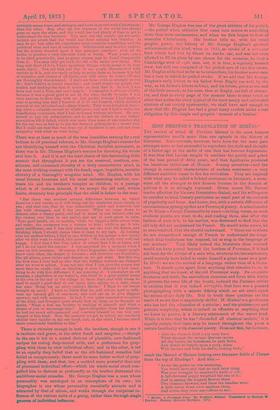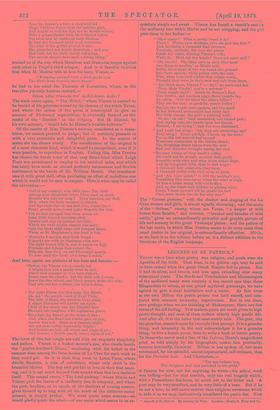MISS PRESTON'S TRANSLATION OF mmtro..
Trn-: revival of which M. Frederic Mistral is the most famous representative recalls more than one episode in the history of literature. Such revivals, however, have been for the most part attempts more or less successful to reproduce the style and thought of a better age in the midst of one that has become degenerate. It was thus that Lucian sought to emulate the purity and grace of the best period of Attic prose, and that Apollonius produced his laborious imitations of Homer. Among ourselves—and the change is eminently characteristic of modern sentiment—a very different ambition seems to fire the revivalists. They are inspired with what may be called a federal sentiment in literature, a senti- ment all the stronger in this domain because in the domain of politics it is so strongly repressed. Hence comes Mr. Barnes' tender affection for his own Dorsetshire dialect, and his willingness to sacrifice to local literary patriotism no small part of the rewards of popularity and fame. And hence, too, with a certain difference of circumstances, sprang np this new Provençal poetry. A schoolmaster at St. Remy—Joseph Roumanille by name—writing verses, as most studious youths are wont to do, and reading them, also after the fashion of such lads, to his mother, was distressed to find that the old lady did not understand his French. He would write verses, he at once resolved, that she should understand. " Since our mothers do not comprehend enough of French to understand the songs which filial tenderness has inspired, let us sing in the language of our mothers !" Very likely indeed the literature thus revived would not have passed beyond the borders of Provence, if it had not been for the advent of a man who, whatever his circumstances, could scarcely have failed to make himself a great name as a poet. In Mireio we see the revival of a language rather than of a litera- ture. It stands quite apart from anything that remains to us, or anything that we know, of the old Provencal song. Its •exquisite freshness and truth, the marvellous clearness and force with which it pictures the rural life of the South, induced the Parisian critics to exclaim that it was indeed atirozDcZY, that here was a peasant photographing with a minute fidelity which no art could equal the scenes of his daily life. But in truth these qualities are the result of an art that is exquisitely skilful. M. Mistral is a gentleman who has had the education of a scholar; and his picturesque and pathetic simplicity, which is indeed as effective as anything that we know in poetry, is a literary attainment of the rarest kind. While it is true that he has " discarded all classical models," it is equally certain that there may be traced throughout the poem a certain familiarity with classical poetry. Does notbhis, for instance,
" Also the chamois bath a joy most keen When through the savage Queiras ravine All day before the •huntsman he bath flown, And stands at length upon a peak, alone With larches and with ice-fields, looking forth,"
reach the Maned of Horace looking over the snow-fields of Thrace from the top of Rhodope ? And this,—
" in for the goblet he was tendering,
You would have said that no such fairy thing Was ever wrought by shepherd's knife or wit ; A full-flowered poppy wreathed the rim of it ; And in among the languid flowers there Two chamois browsed, and these the handles were. A little lower down were maidens three, And cartes they were marvellous to see : • Mintio: a Proveava Poem. By Frdderie Mistral. Translated by%larriee W. Preston. Boston: Roberts Brothers. 1872. Near by, beneath a tree, a shepherd lad Slept, while on tiptoe stole the maiden glad, And sought to seal his lips, ero he should waken, With a grape-cluster from their basket taken. Yet even now he smiles at their illusion, So that the foremost maid is all confusion. The odor of the goblet proved it new The giver had not drunk therefrom ; and you Had said, but for their woody colouring, The careen shapes were each a living thing,"
remind us of the cup which Menalcas and Daincetas wager against each other in Virgil's third eclogue. And is it fanciful to think that when M. Mistral tells us how his hero, Vincen,-
"Prancing onward with a stick made spin The flints from wayside stone heaps,"
he had in his mind the Thalusia of Theocritus, where, as the traveller joyously hastens onward,—
riecaze lido; irraisiou Tor' apSoXibEcroy cleiSgi?
The sixth canto again, "The Witch," where Vincen is carried to be healed of his grievous wound by the charms of the witch Taven, and where the action of the poem is interrupted to give an account of Provençal superstition, is obviously formed on the model of the " Descent " in the Odyssey. But M. Mistral, by his own account, " would fain be Homer's humble follower."
Of the merits of Miss Preston's volume, considered as a trans- lation, we cannot pretend to judge ; but it certainly presents us with a very attractive and delightful poem. In the matter of metre she has chosen wisely. The versification of the original is of a most elaborate kind, which it would be inexpedient, even if it were possible, to reproduce in English. Failing this, Miss Preston has chosen the heroic verse of that easy fluent kind which Leigh Hunt was accustomed to employ in his metrical tales, and which has lately been made an almost perfectly harmonious and flexible instrument in the hands of Mr. William Morris. Our translator uses it with great skill, often producing an effect of melodious ease which it would not be easy to surpass. Here is what may be called the invocation :—
" God of my country, who didst have Thy birth Among poor shepherds when Thou wast on earth, Breathe fire into my song ! Thou knowest, my God, How, when the lusty summer is abroad, And figs turn ripe in sun and dew, comes he,— Brute, greedy man,—and quite despoils the tree.
"Yet on that ravaged tree thou sanest oft Some little branch inviolate aloft, Tender and airy up against the blue, Which the rude spoiler cannot win unto : Only the birds shall come and banquet there, When, at St. Magdalene's, the fruit is fair.
"Methinks I see you airy little bough : It mocks me with its freshness even now ; The light breeze lifts it, and it waves on high Fruitage and foliage that cannot die. Help me, dear God, on our Provencal speech, To soar until the birds' own home I reach."
And here, again, are pictures of the hero and heroine :— " Certes, our Vincen was a comely lad. A bright face and a manly form he had, Albeit that summer he was bare sixteen. Swart were his cheeks; but the dark soil, I weon, Bears the fine wheat, and black grapes make the wino
That sets our feet a-dance, our eyes .a-shine.
4‘ Not quite fifteen was this same fair Mireio.
Ah, me! the purple coast of Font Vieio, The hills of Bans, the desolate Crau plain, A shape like hers will hardly see again.
Child of the merry sun, her dimpled face Bloomed into laughter with ingenuous grace.
"Eyes had she limpid as the drops of dew ; And, when she fixed her tender gaze on you, Sorrow was not. Stars in a summer night Are not more softly, innocently bright : And beauteous hair, all waves and rings of jet ;
And breasts, a double peach, scarce ripened yet'.
The loves of this fair couple are told with an exquisite simplicity and pathos. Vincen is a basket-weaver's son, who dwells beside the "poplar-bordered Rhone," wandering with his father in the Bummer time among the farm-houses of La Crau for such work as they could get. So it is that they come to Lotus Farm, where dwells Ramoun, a man of substance, whose only child is the beautiful Mireio. The boy and girl fall in love at their first meet- ing, and it is not much beyond their second when this love declares itself. This second canto, "The Leaf-picking," where Mireio and Vincen pick the leaves of a mulberry tree in company, and where the poet, heedless, so to speak, of the shadows of coming sorrow, gives himself up to sing with all his heart of the delicious sunny present, is simply perfect. We must quote some stanzas—we would gladly quote the whole—of one scene which seems to us ex-
quisitely simple and sweet. Vincen has found a tomtit's nest in the mulberry tree which Mireio and he are stripping, and the girl puts them in her bodice:-
"' How many ! What a pretty brood it is !
There I There, poor darlings, give me just one kiss !'
And, lavishing a thousand fond caresses, Tenderly, carefully, the four she places Inside her waist, obeying Vincen's will; While he, Hold out thy hands ! there are more still !
"'Oh, sweet ! The little eyes in each blue head Are sharp as needles,' as Mireio said Softly, three more of the wee brood she pressed Into their smooth, white prison with the rest, Who, when bestowed within that refuge warm, Thought they were in their nest and safe from harm.
" Are there more, Vincen ? Ay! ' he answered her.
' Then, Holy Virgin ! you're a sorcerer !'
'Thou simple maid ! About St. George's Day, Ton, twelve, and fourteen eggs, these tomtits lay.
Ay, often. Now let these the others follow!
They are the last : so good-by, pretty hollow ! '
"But ore the words were spoken, and the maid In her flowered neckerchief had fairly laid Her little charge, she gave a piercing wail : 'Oh me ! oh me!! ' then murmered, and turned pale; And, laying both her hands upon her breast, Moaned, 'I am dying ! ' and was sore distressed, "And could but weep : Ah, they are scratching me! They sting! Come quickly, Vincen, up the tree ! For on the last arrival had ensued Wondrous commotion in the hidden brood; The fledglings latest taken from the nest Had sore disorder wrought among the rest.
"Because within so very small a valley All could not lie at ease, so must they gayly Scramble with claw and wing down either slope, And up the gentle hills, thus to find scope : A thousand tiny somersets they turn, A thousand pretty rolls they seem to learn.
"And 'Ah, come quick !' is still the maiden's cry. Trembling like vine-spray when the wind is high, Or like a heifer stung with cattle-flies.
And, as she bends and writhes in piteous wise,
Leaps Vincen upward till he plants his feet
Once more beside her on her airy so'at."
The " Cocoon pictures," with the chatter and singing of the La Crau women and girls, is almost equally charming ; and the canto of the " Suitors," among whom are Veran, " a keeper of wild horses from Sambu," and Ourrias, " breaker and breeder of wild cattle," gives an extraordinarily powerful and graphic picture of life and scenery in the great Provençal plains ; and the pathos of the last canto, in which Miss Preston seems to do even more than usual justice to her original, is extraordinarily effective. Mireio, as we have it in the volume before us, is a distinct addition to the literature of the English language.



































 Previous page
Previous page